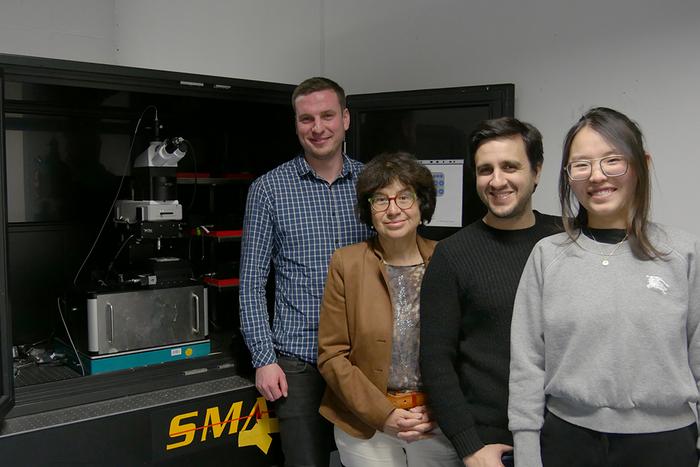Surface sensitive spectroscopy

Credit: © RESOLV, Kasper
Surface sensitive spectroscopy
In order to understand the complex behavior at electrified interfaces, the team examined a critical parameter, called the acid dissociation constant (pKa) of molecules at electrified metal/water interfaces. Whereas in bulk solutions, this value is well known, it has been speculated that this parameter, which is essential for acid/base chemistry can be quite different in the vicinity of electrodes. However, measuring pKa values under electrochemical conditions is experimentally challenging. To address this, the group of Havenith have combined advanced surface specific spectroscopic techniques, notably Surface-Enhanced Raman Spectroscopy (SERS), with theoretical modelling. The results vary with the applied voltage: Acid-base chemistry at electrified interfaces, is clearly different from chemistry in the bulk solution.
Hydrophobic layer and strong electric fields
Their findings highlight two key mechanisms governing acid-base reactions at electrified interfaces: The influence of local hydrophobicity and the impact of strong local electric fields. By analyzing the protonation/deprotonation of glycine molecules, the researchers observed a hydrophobic water/water interface close to the metal surface, leading to a destabilization of zwitterionic forms of glycine. When increasing the applied potential the effect is amplified.
Their results showcase the changes of local solvation properties at metal/water interfaces, presenting new avenues for fine-tuning reactivity in electrochemistry. These insights offer new opportunities for optimizing electrochemical processes and designing novel strategies for catalysis as both factors can be tuned in a controlled way.
Journal
Journal of the American Chemical Society
DOI
10.1021/jacs.3c13633
Method of Research
Experimental study
Subject of Research
Not applicable
Article Title
Tuning Acid-Base Chemistry at an Electrified Gold/Water Interface
Article Publication Date
10-Apr-2024




